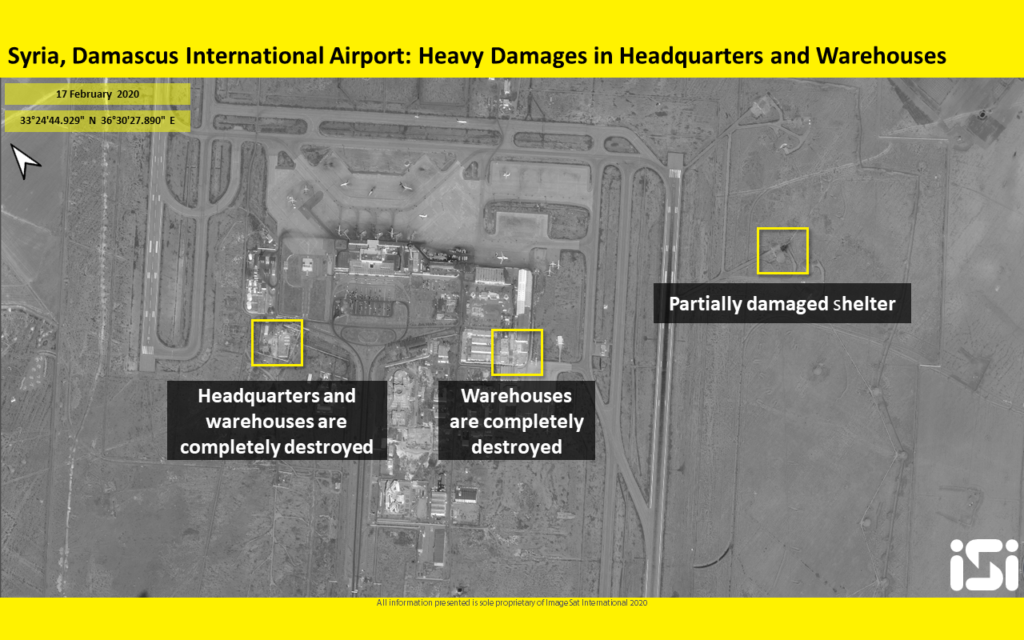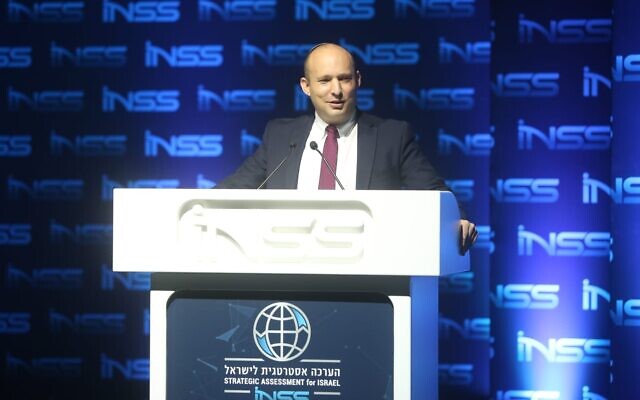Bennett says Tehran’s efforts to establish a permanent military presence to Israel’s north are ‘weakening,’ Jerusalem will step up its fight against it
Today, 1:34 pm
Defense Minister Naftali Bennett speaks at the Institute for National Security Studies think tank’s annual conference in Tel Aviv on January 29, 2020. (Ariel Hermoni/Defense Ministry)
Defense Minister Naftali Bennett on Tuesday said Israel was beginning to see signs of Iran reconsidering its efforts to establish a permanent military presence in Syria.
“I can tell you that we are seeing the initial indications of Iran weakening and considering a new tack in Syria,” Bennett said, speaking at the New-Tech 2020 military technology conference in Tel Aviv.
Bennett indicated that this potential change in direction is due to Israel’s efforts to counter Iran’s strategy, though other defense officials and analysts have said it is likely the result of the death of the commander of the Islamic Revolutionary Guard Corps’ Quds Force, Qassem Soleimani, in an American airstrike last month. Soleimani, as the head of the expeditionary Quds Force, was largely responsible for developing and executing Iran’s policies in Syria.
“[The Iranians] are sending forces in order to establish a presence there to exhaust us, but we are turning this disadvantage into an advantage. We have intelligence and operational superiority, and we are telling the Iranians clearly: Get out of Syria. There’s nothing for you here,” the defense minister said.
Bennett said Israel plans to intensify the pressure it is putting on Iran.
“We are moving from a defensive position to an offensive position — to weaken, to exhaust, to tire and wear out the head of the octopus in order to weaken its arms,” Bennett said, using an analogy he often employs, comparing Iran to an octopus, with Iranian proxies as its arms.
The defense minister said Iran was particularly vulnerable now, as people in the country continue to protest the government’s adventurism abroad while the economic situation domestically deteriorates due to American financial sanctions.
“There are demonstrations on the streets of Iran, the Persian people are telling the ayatollahs: ‘Stop wasting money and our blood on adventures,’” Bennett said.
The defense minister’s comments came hours after satellite images were released showing significant damage to warehouses and office buildings at Damascus International Airport, from airstrikes last Thursday that were attributed to Israel.
The photographs, released by the private satellite imagery analysis firm ImageSat, showed that several warehouses, apparently used to store weapons that were flown into Syria from Iran, were destroyed in the strikes along with buildings used as headquarters for the operations at the site.
In addition, a hangar was damaged in the attack, which Syria blamed on Israel. ImageSat said the shelter was “probably used for storing ammunition or [surface-to-air missiles].”

Satellite images purporting to show damage to Damascus International Airport in February 13 airstrikes attributed to Israel, which were released by ImageSat International, on February 17, 2020. (ImageSat International)
At approximately 11:45 p.m. last Thursday, incoming missiles struck five weapons depots near Damascus International Airport, including an attack on a military position south of the Syrian capital, the al-Arabiya news channel reported, citing unidentified sources.
The attack came hours after a shipment — reportedly of munitions — arrived at the airport from Tehran, according to flight data.
Four members of Iran’s Islamic Revolutionary Guard Corps and three Syrian soldiers were killed in the strikes, according to a Britain-based Syrian Observatory for Human Rights war monitor.
Both Syria and the Observatory said Israel was behind the strike. The Israeli military did not comment on the matter, in accordance with its longstanding policy of neither confirming nor denying such operations abroad.

A fireball lights up the night sky near Damascus during an attack on a target near the capital on February 13, 2020. (Screen capture: Al-Ikhbariyah Syria TV)
Asked about Israel’s alleged involvement in a Friday morning interview to Radio Haifa, Prime Minister Benjamin Netanyahu said: “I don’t comment on one operation or another.
“I don’t know what happened at night. Maybe it was the Belgian air force,” he quipped.
The late-night strikes came just over a week after a series of strikes on several targets near Damascus reportedly killed 23 pro-Iranian fighters. The Israel Defense Forces did not acknowledge carrying out the strikes, but Syrian state media blamed Israel, and days later Bennett seemingly took credit for it, saying Israel had carried out an attack against Iran in the previous week and noting: “Foreign media reported this week that 23 Syrians and Iranians were killed there. Those are large numbers and we will do more and more.”
Israel has long maintained that it will not tolerate efforts by Iran — a close ally of Syrian dictator Bashar Assad — to establish a permanent military presence in Syria and would take steps to thwart such entrenchment. Israel accuses Iran of seeking to set up a military presence in Syria that could be used as a launchpad for attacks against the Jewish state.

IDF troops near the Israel-Syria border, in the Golan Heights on January 3, 2020. (Basel Awidat/Flash90)
Though Israeli officials generally refrain from taking responsibility for specific strikes in Syria, they have acknowledged conducting hundreds to thousands of raids in the country since the start of the Syrian civil war in 2011.
These have overwhelmingly been directed against Iran and its proxies, notably the Lebanese Hezbollah terror group, though the IDF has also carried out strikes on Syrian air defenses when those batteries have fired at Israeli jets.




Leave a Reply
You must be logged in to post a comment.